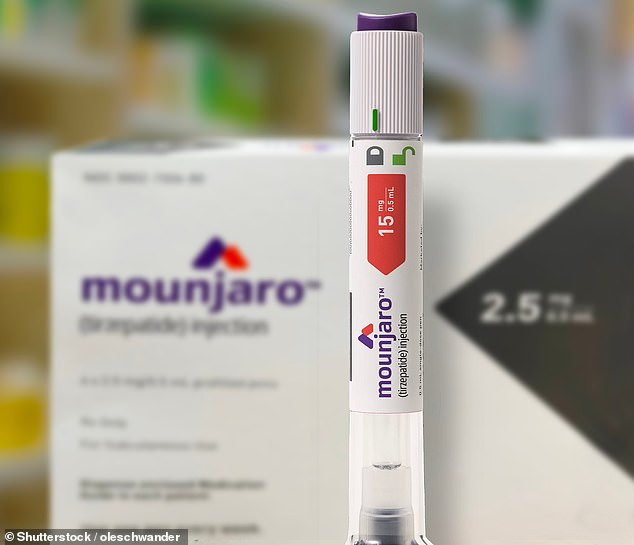[ad_1]
Mounjaro could help slash the risk of breast cancer tumours developing, exciting new research has suggested.
The game-changing weight loss jabs have ushered in a new era in the war on obesity, but have also been linked to other health benefits, such as reducing the risk of heart attacks, strokes and kidney disease.
Now, scientists have discovered that tirzepatide—the ingredient behind Mounjaro—may ‘significantly’ slow the growth of breast cancer tumours.
American scientists, who carried out the trial, said the findings on mice show the drugs have a ‘beneficial impact’ on women with the disease.
However, they cautioned further research was necessary to confirm their findings.
Researchers also didn’t speculate why the drug, which belong to class of medications called GLP-1 agonists, might lower a patient’s chances of cancer.
It comes as breakthrough research in May revealed that GLP-1s could help ward off up to 14 types of cancer including breast.
Studies have also suggested obesity is a major risk factor in breast cancer returning and weight loss could improve outcomes.

The game-changing weight loss jabs have ushered in a new era in the war on obesity, but have also been linked to other health benefits, such as slashing the risk of heart attacks, strokes and kidney disease
Amanda Kucinskas, a research fellow in obesity and breast cancer risk at the University of Michigan and study author, said: ‘While it is very preliminary data, our studies in mice suggest that these new anti-obesity drugs may be a way to reduce obesity-associated breast cancer risk or improve outcomes.
‘While these are very preliminary results, they suggest that this new anti-obesity drug may also have a beneficial impact on breast cancer outcomes,’
In the study, researchers tracked 16 nine-week-old mice with breast cancer tumours who were fed a high-fat diet to induce obesity.
At 32 weeks old—roughly middle age for a mouse—the obese animals were divided into two groups.
One group received tirzepatide injections every other day for 16 weeks, and the other a placebo.
Scientists then measured the mice’s weight and tumour growth twice a week.
They found mice on the medication lost around a fifth of their body weight—roughly the average weight lost by patients taking Mounjaro long term.
The fat loss occurred mainly in adipose tissue, the body’s fat-storing cells.

Currently, all women aged between 50 and 70 are invited for screening every three years, with the first invitation between the age of 50 and 53
Mice treated with tirzepatide also had significantly smaller tumors, the scientists said.
There was a ‘clear link’ between lower body weight and smaller tumor size, while total fat mass was also ‘strongly linked’ to how large the tumors became, they added.
However, they cautioned that exactly how tirzepatide slowed tumour growth was not yet understood and further tests, including in humans, would first be necessary.
The findings were presented in full this week at ENDO 2025, the Endocrine Society’s annual meeting in San Francisco.
It comes as research presented at the American Society for Clinical Oncology (ASCO) annual conference in May suggested GLP-1s could slash the risk of 14 obesity-related cancer—including breast—for people with diabetes.
US scientists found those on GLP-1s had a 7 per cent lower risk of developing an obesity-related cancer than patients on DDP-4 inhibitors, another diabetes medication.
When other health benefits were factored in, these patients were also 8 per cent less likely to die over the 10-year period.
In December, groundbreaking research presented at the San Antonio Breast Cancer Symposium also suggested the jabs could also help protect against breast cancer returning.
One study of more than 1,000 patients by the University of Texas found obese patients who took the drugs for just over a year after finishing treatment on average had a ‘significantly improved’ chance of living longer.
However, surprisingly, they also found patients taking hormone drugs such as tamoxifen—given to many women to stop breast cancer recurrence—gained weight, despite using the jabs.
At the time, experts told MailOnline they were unsure why this happened.
But they suggested it may be because hormone therapy typically causes patients to gain weight, meaning the jabs aren’t able to work effectively.
For these patients, ‘we may need to go up to a higher dose’, Professor Neil Iyengar, then an oncologist at the Memorial Sloan Kettering Cancer Centre, New York, said.
[ad_2]
This article was originally published by a www.dailymail.co.uk . Read the Original article here. .

